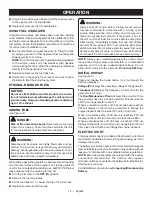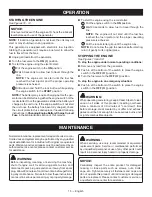
12 — English
INSTALLING THE WHEELS
See Figure 6.
Wheels are provided to assist in moving the generator to
the desired location and should be installed on the same
side as the handle.
Locate the following items:
2 axles
2 hitch pins
2 washers
2 wheels
Raise the end of the generator where the handle is located
high enough to gain access to the frame bottom; securely
position props underneath to support.
Slide the axle through the hole in the center of the wheel.
Slide a washer onto the axle, then slide the axle into the
wheel mounting hole as shown.
Insert hitch pin to secure.
NOTE:
The hitch pin should be pushed into the axle until
the center of the pin rests on top of the axle.
Repeat with the second wheel.
CONNECTING/DISCONNECTING BATTERY
See Figure 7.
WARNING:
To reduce the risk of electrocution or explosion, do not
short circuit the battery terminals or charge in a sealed
container. Keep sparks and flame away.
ASSEMBLY
WARNING:
Keep metal objects away from the battery terminals.
Metal objects can make a connection from one terminal
to another. Shorting the battery terminals together can
cause sparks, burns, or a fire.
NOTICE:
The battery may require charging before the generator
can be started using either the engine switch or the recoil
starter. Once the generator is started, the battery will
charge as the unit runs.
The battery cables must be connected before the generator
can be operated.
To connect battery cables:
Connect the red wires to the positive (+) terminal first,
then connect the black wire to the negative (-) terminal.
Make sure all connections are tight.
NOTE:
Be careful not to short across the terminals when
installing. Shorting the terminals together can cause
sparks, damage to the battery or generator, or even burns
or explosions.
Cover the terminals with the rubber covers.
When removing the battery for replacement:
disconnect
the negative (black) post, then the positive (red) post, being
careful not to short across the terminals. Always abide by the
safety warnings provided with the battery. Remove the battery
and dispose of according to local and state regulations.
OPERATION
DANGER:
Carbon Monoxide.
Using a generator indoors CAN KILL YOU IN MINUTES.
Generator exhaust contains high levels of carbon monoxide (CO), a poisonous gas you cannot see or smell. If you can
smell the generator exhaust, you are breathing CO. But even if you cannot smell the exhaust, you could be breathing CO.
Never use a generator inside homes, garages, crawlspaces, or other partly enclosed areas. Deadly levels of carbon
monoxide can build up in these areas. Using a fan or opening windows and doors does NOT supply enough fresh
air.
ONLY use a generator outdoors and far away from open windows, doors, and vents. These openings can pull in
generator exhaust.
Even when you use a generator correctly, CO may leak into the home. ALWAYS use a battery-powered or battery-backup
CO alarm in the home.
If you start to feel sick, dizzy, or weak after the generator has been running, move to fresh air RIGHT AWAY. See a doc-
tor. You could have carbon monoxide poisoning.
















































